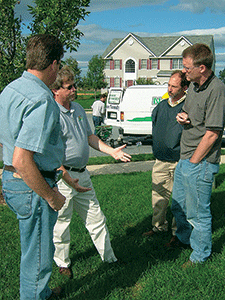
Franchises have advanced, but franchisors aren’t too eager to mess with what’s long been a winning formula.
With the advent of technology, increased emphasis on branding and better equipment, franchising has changed a lot over the years. But even with all its advances, its core has not budged.
“The concept of franchising is the same now as it always has been — proven systems that allow someone to start a business and be successful in a very short period of time,” says Ron Madera, president of The Grounds Guys, Waco, TX.
Franchisors and franchisees are “strategic partners,” Madera says. “We share a brand, and we have to build the brand together.”
Like Madera, Nutri-Lawn Chief Operating Officer Jordan Lavin says his company seeks franchisees who share Nutri-Lawn’s attitude.
“They have to fit the culture of the company so they can take advantage of our system properly,” Lavin says.
According to U.S. Lawns Vice President Paul Wolbert, property managers in the franchise business used to manage properties within 60 miles of them, and “now they’re managing buildings anywhere from coast to coast. That lends itself to the franchise model, because you’re able to meet customers’ expectations no matter where they are. A Big Mac tastes the same in Cleveland as it does in Orlando.” The level of service is the same from city to city as well, Wolbert says, because the franchisor ensures it.
Technological advances
The development of new technologies has changed franchising most dramatically, Madera says, including GPS, iPhones and text messaging. “We can move at light speed now,” he says. “We can do much more business faster and better now.”
The Grounds Guys uses something called Geo Fencing, in which a GPS system is under the hood of the vehicle, so remotely the franchisor can evaluate his trucks, see how fast trucks are moving and assess whether the engine is running or not.
Technology has played a critical role at Nutri-Lawn over the past five or six years, Lavin says, helping in benchmarking and best practices.
“Now we can actually share best practices from data, and it’s hard data,” he says. “‘Here are the facts on what location X is producing and how they’re doing it.’ It really changes the game for us.”
Thanks to technology, Wolbert says, it’s now easier to meet the needs of the customer than ever before — and to do it quickly.
Have a clear message
The core concepts of any franchise are the same, whether it be a lawn care franchise or restaurant franchise, says NaturaLawn President Phillip Catron. “But you have inherent differences based on company culture and internal corporate philosophy,” he says.
Having a clear message and distinct identity is vital to a franchise’s success, Catron says. “The focus is very pinpointed,” he explains. “In any business you can integrate many things into it, but the less focused you become on your core business, the more likely it is that your brand will be diluted and fail.”
Treating your people right
Franchise execs know their companies are only as good as their people. So rewarding franchisees and staff is integral to growth. Catron’s been known to shut down NaturaLawn mid-week to host a pizza party or have film screenings.
“We have fun, we really do — everybody, the franchisees too,” Catron says. “We try to take care of the family.”
Nutri-Lawn too, has a close relationship with its franchisees, hosting a one-week trip with them every year.
Catron, Madera and Lavin all stress that an import success factor in this business is your people. “A true entrepreneur will not make a good franchisee,” Catron says. “They want to do everything their own way. You want someone who understands the benefits of a business system. You follow the system, I can grow your business with you, but if you start deviating, I don’t know. I haven’t checked that one out yet.”
“Everybody’s in business for different reasons,” Lavin adds. “And unless you know why they’re in business it’s very difficult to understand them.”
